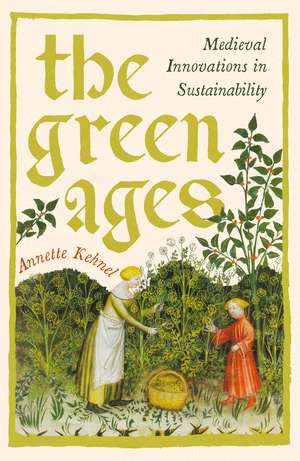The Green Ages: Medieval Innovations in Sustainability
Autor Annette Kehnelen Limba Engleză Hardback – 7 aug 2024
Communities that operated a barter trade system on the Monte Subiaco in Italy. Sustainable fishing at Lake Constance. Common lands in the UK. The medieval answer to Vinted in the middle of Frankfurt.These are all just some of the sustainability initiatives from the Middle Ages that Annette Kehnel illuminates in her astounding new book, The Green Ages. From the mythical-sounding City of Ladies and their garden economy to early microcredit banks and rent-a-cow schemes, Kehnel uncovers a world at odds with what we might think of as the typical medieval existence.Pre-modern history is full of inspiring examples and concepts that open up new horizons. And we urgently need them as today's challenges - finite resources, the twilight of consumerism, growing inequality - threaten what we have come to think of as a modern way of living sustainably.This is a revelatory look at the past that has the power to change our future.
| Toate formatele și edițiile | Preț | Express |
|---|---|---|
| Hardback (2) | 133.49 lei 3-5 săpt. | +60.58 lei 6-12 zile |
| Profile – 7 aug 2024 | 133.49 lei 3-5 săpt. | +60.58 lei 6-12 zile |
| Brandeis University Press – 26 sep 2024 | 213.37 lei 3-5 săpt. |
Preț: 133.49 lei
Preț vechi: 169.55 lei
-21% Nou
25.54€ • 26.74$ • 21.19£
Carte disponibilă
Livrare economică 20 martie-03 aprilie
Livrare express 05-11 martie pentru 70.57 lei
Specificații
ISBN-10: 1800816251
Pagini: 352
Ilustrații: TBC
Dimensiuni: 162 x 236 x 38 mm
Greutate: 0.56 kg
Ediția:Main
Editura: Profile
Colecția Profile Books
Locul publicării:London, United Kingdom
Notă biografică
Professor Annette Kehnel studied History and Biology at the University of Freiburg, Sommerville College, Oxford and LMU in Munich. She received her doctorate from Trinity College, Dublin for her research on Irish convent communities and taught at the TU Dresden, where she received her post-doctorate in 2004. Since 2005 she has held a chair in Medieval History at the University of Mannheim. She has published numerous works on her main topics of research: cultural and economic history and historical anthropology.
Recenzii
Finally, a historically enlightening approach to the sustainability debate ... A wonderful and much-needed book
A committed and thought provoking book, rich in engaging examples and surprising alternatives, that makes it clear we need the past for our future
Cuprins
1. Was Everyone Poor Before We Invented Capitalism?
1.1. The History of Progress: Modern Grand Narratives and their Pitfalls
1.2. Did Our Forebears Toil from Dawn till Dusk?
1.3. Europe in the High to Late Middle Ages: Some Dates and Figures
2. Sharing
2.1. Sharing Brings Riches: Convent Economy
2.2. Commons, and the Art of Internalising the External
2.3. Beguinages: Female Communities and Urban Gardening
3. Recycling
3.1. Maintenance Jobs and Second-Hand Markets
3.2. Paper: A Recycled Product Writes World History
3.3. Bricolage and Assemblage: Antiquity Repurposed for the Middle Ages
4. Microfinance
4.1. Microfinance Institutions in Italian Cities: The Monti di Pietà
4.2. Peer-to-Peer Lending in Medieval Towns
4.3. Agriculture on the Edge of Town: Medieval Rent-a-Cows
5. Philanthropy
5.1. Funding for Community Projects: Pont Saint-Bénézet in Avignon
5.2. Cultural and Social Sustainability: No Indulgences, No Michelangelo
5.3. Social Housing in Augsburg: The Fuggerei
6. Minimalism
6.1. Wealth is the Vomit of Fortune: Diogenes of Sinope
6.2. Money is Dung: St Francis of Assisi
6.3. Minimalism and Economic Theory: Pierre de Jean Olivi
7. What the Past Can Teach Us About the Future
7.1. What Would Our Ancestors Advise?
7.2. How to Escape the Prison of Inevitability
7.3. History: A Cure for Chronophobia
